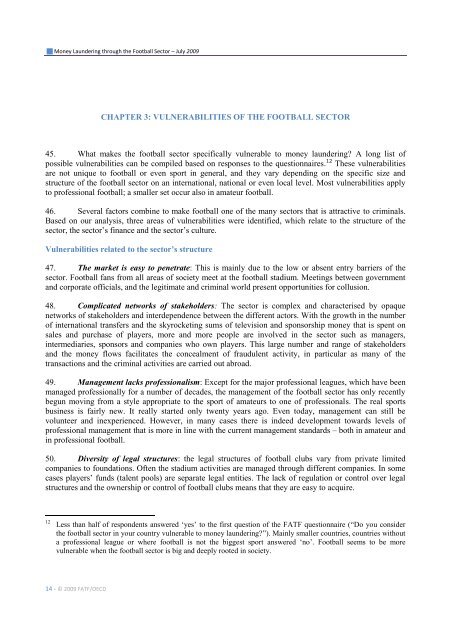Money Laundering through the Football Sector
Money Laundering through the Football Sector
Money Laundering through the Football Sector
You also want an ePaper? Increase the reach of your titles
YUMPU automatically turns print PDFs into web optimized ePapers that Google loves.
<strong>Money</strong> <strong>Laundering</strong> <strong>through</strong> <strong>the</strong> <strong>Football</strong> <strong>Sector</strong> – July 2009<br />
14 - © 2009 FATF/OECD<br />
CHAPTER 3: VULNERABILITIES OF THE FOOTBALL SECTOR<br />
45. What makes <strong>the</strong> football sector specifically vulnerable to money laundering? A long list of<br />
possible vulnerabilities can be compiled based on responses to <strong>the</strong> questionnaires. 12 These vulnerabilities<br />
are not unique to football or even sport in general, and <strong>the</strong>y vary depending on <strong>the</strong> specific size and<br />
structure of <strong>the</strong> football sector on an international, national or even local level. Most vulnerabilities apply<br />
to professional football; a smaller set occur also in amateur football.<br />
46. Several factors combine to make football one of <strong>the</strong> many sectors that is attractive to criminals.<br />
Based on our analysis, three areas of vulnerabilities were identified, which relate to <strong>the</strong> structure of <strong>the</strong><br />
sector, <strong>the</strong> sector‟s finance and <strong>the</strong> sector‟s culture.<br />
Vulnerabilities related to <strong>the</strong> sector’s structure<br />
47. The market is easy to penetrate: This is mainly due to <strong>the</strong> low or absent entry barriers of <strong>the</strong><br />
sector. <strong>Football</strong> fans from all areas of society meet at <strong>the</strong> football stadium. Meetings between government<br />
and corporate officials, and <strong>the</strong> legitimate and criminal world present opportunities for collusion.<br />
48. Complicated networks of stakeholders: The sector is complex and characterised by opaque<br />
networks of stakeholders and interdependence between <strong>the</strong> different actors. With <strong>the</strong> growth in <strong>the</strong> number<br />
of international transfers and <strong>the</strong> skyrocketing sums of television and sponsorship money that is spent on<br />
sales and purchase of players, more and more people are involved in <strong>the</strong> sector such as managers,<br />
intermediaries, sponsors and companies who own players. This large number and range of stakeholders<br />
and <strong>the</strong> money flows facilitates <strong>the</strong> concealment of fraudulent activity, in particular as many of <strong>the</strong><br />
transactions and <strong>the</strong> criminal activities are carried out abroad.<br />
49. Management lacks professionalism: Except for <strong>the</strong> major professional leagues, which have been<br />
managed professionally for a number of decades, <strong>the</strong> management of <strong>the</strong> football sector has only recently<br />
begun moving from a style appropriate to <strong>the</strong> sport of amateurs to one of professionals. The real sports<br />
business is fairly new. It really started only twenty years ago. Even today, management can still be<br />
volunteer and inexperienced. However, in many cases <strong>the</strong>re is indeed development towards levels of<br />
professional management that is more in line with <strong>the</strong> current management standards – both in amateur and<br />
in professional football.<br />
50. Diversity of legal structures: <strong>the</strong> legal structures of football clubs vary from private limited<br />
companies to foundations. Often <strong>the</strong> stadium activities are managed <strong>through</strong> different companies. In some<br />
cases players‟ funds (talent pools) are separate legal entities. The lack of regulation or control over legal<br />
structures and <strong>the</strong> ownership or control of football clubs means that <strong>the</strong>y are easy to acquire.<br />
12 Less than half of respondents answered „yes‟ to <strong>the</strong> first question of <strong>the</strong> FATF questionnaire (“Do you consider<br />
<strong>the</strong> football sector in your country vulnerable to money laundering?”). Mainly smaller countries, countries without<br />
a professional league or where football is not <strong>the</strong> biggest sport answered „no‟. <strong>Football</strong> seems to be more<br />
vulnerable when <strong>the</strong> football sector is big and deeply rooted in society.


